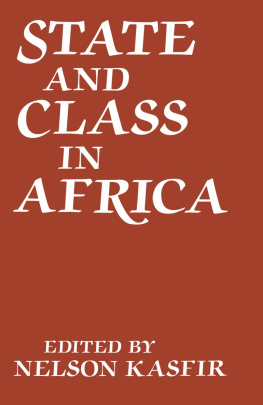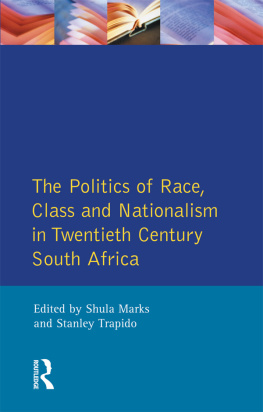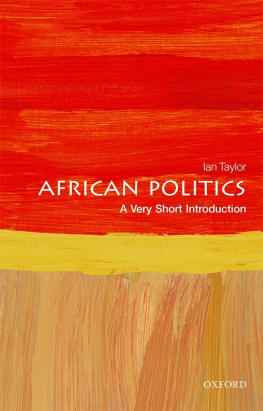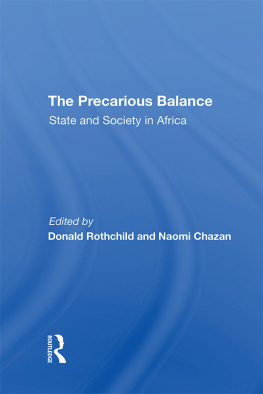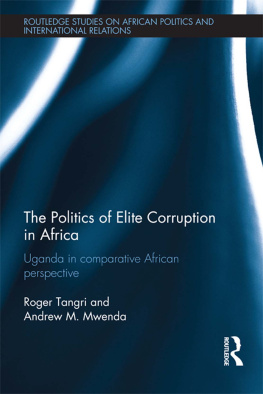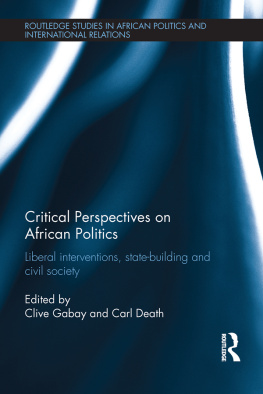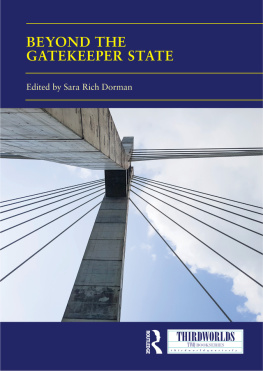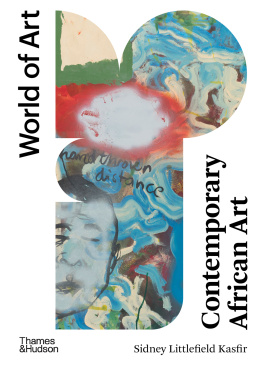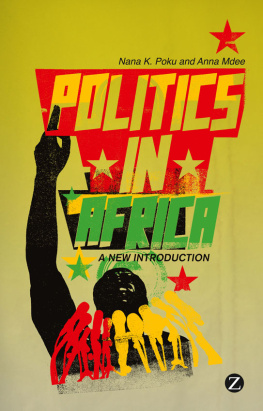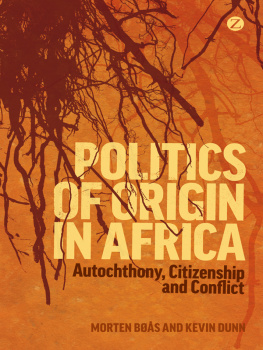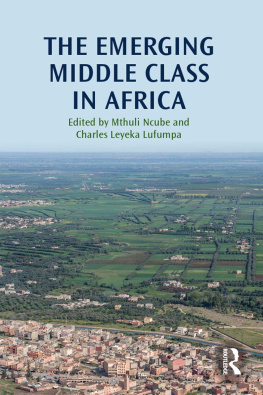First published 1984 in Great Britain by
Routledge
2 Park Square, Milton Park, Abingdon, Oxon, OX14 4RN
270 Madison Ave, New York NY 10016
Transferred to Digital Printing 2007
Copyright 1984 Routledge
British Library Cataloguing in Publication Data
State and class in Africa.(Journal
of Commonwealth and comparative politics,
ISSN 0306-3631; v. 21, no. 3)
1. Social classesAfrica 2. Africa
Politics and government1960
I. Kasfir, Nelson II. Series
305.5'096 HN780.Z9S6
ISBN 0-7146-3239-2
This group of studies first appeared in a Special Issue on 'State and Class in Africa' of The Journal of Commonwealth and Comparative Politics , Vol. XXI, No.3, published by Routledge
All rights reserved. No part of this publication may be reproduced, stored in a retrieval system, or transmitted in any form, or by any means, electronic, mechanical, photocopying, recording, or otherwise, without prior permission of Routledge
Publisher's Note
The publisher has gone to great lengths to ensure the quality of this reprint but points out that some imperfections in the original may be apparent
by
Nelson Kasfir
Dartmouth College
With the demise of modernisation analysis and the eclipse of dependency theory as paradigms of explanation, a more adequate opportunity has opened for examining relationships between class and state in Africa. Yet the loss of comforting general guidelines in no way removes the basic problems identified by each approach. Instead, there is a peculiar collection of relevant concepts resting uneasily side by side. By assessing the fit of these concepts to specific African experience over the past decade or so, we can piece together less ambitious but more precise connections between class and state. The important questions concern the limits within which classes can make effective use of states and the extent to which states possess the capability to act independently of either internal or external social structures: be they classes, ethnic groups, clientelistic networks, multinational companies, or international agencies,
If the state was endowed with extraordinary autonomy by modernisation analysts, it was kept on a tight leash by dependency thinkers. If class was conspicuous by its absence in writings on modernisation, firm control by an external class was taken for granted in dependency analysis. If the purpose of the 'modernising' state was to create the collective goods of national integration and development for the benefit of all citizens, the 'dependent' state merely organised African production for external profit.
Weberian perspectives stand at one end of this spectrum, Marxist notions at the other. Taking either as a fully coherent model of social thought rules out the analytic advantages of the other. Can Weber's insistence that stable economic orders rest on the organisation of social values be profitably combined with Marx and Engel's prescient observation that the bourgeoisie 'has made barbarian and semi-barbarian countries dependent on the civilised ones, nations of peasants on nations of bourgeois, the East on the West'? No simple or straightforward reconciliation will be possible. For the state cannot both rest on a consensual framework of legitimate authority that relegates all social groups to secondary roles and serve as the coercive instrument of a dominant and unrestrained class.
But Marx and Weber both recognised that the state claims a monopoly over the means of violence, and thus has the potential to become a powerful instrument of domination. Engels and Weber attributed the same formal qualities to the state - administration over a given territory, establishment of a state apparatus including a public force, and extraction of taxes from the populace for its maintenance. The organi sational advantage of political domination in order to extract resources from other social groups provides one measure of common ground on which both Marxist and Weberian insights can usefully be conjoined.
But since the possible extent of state control over resources is a consequence of the social and economic order in which the holders of state power must act, the strength of competitors for economic resources, classes - whether classes or other social groups - must be considered. Although not in so nearly focused a fashion as Marx, Weber also discussed the contribution of class advantage to social stratification. Both saw the vital role the state could play in consolidating the class position of a dominant social group. For Marx the state is typically the instrument through which a firm grip on the means of production could be secured by a class. For Weber the appropriation of economic opportunities widens social stratification which 'in turn ... [will] lead to the monopolistic appropriation of governing powers and of the corresponding economic advantages'. They differ, of course, on the degree of potential state autonomy from dominant classes. But analysis of the uses of the state to create and strengthen class position provides a second area of agreement between these two modes of social thought.
Imperialism imposed the context in which we may consider these points of convergence in Africa. Forced to respond to an externally driven dynamic, African societies, their modes of production, and their patterns of political control were drastically reconstituted. Although those occupying privileged niches in precolonial stratification were sometimes able to maintain their advantage afterwards, these changes were revolutionary. In other words, the colonial African state was given responsibility for a more extensive and ramified task than any state in Europe had dreamt of undertaking at home: the integration of entirely new forms of local production into metropolitan capitalism. Nothing further from the nineteenth-century liberal conception of the night-watchman state could be imagined.
Economic dislocations of this magnitude necessarily reshaped the distribution of local opportunities to create wealth, and thus also revolutionised class stratification. New demands for export crops and mining labour as well as clerical requirements for the newly established colonial bureaucracies and military recruitment to staff local constabularies resulted in the initiation of new class possibilities and new relationships among classes. Organising coffee, cotton, and cocoa for export altered the relationships between those who produced these crops and those who did not, as well as among those who produced the different cash crops or worked in the mines. The relations of producers to the land they worked was frequently changed - quite dramatically where freehold tenure or land registration was introduced. In addition, the processes by which a portion of the product was extracted by those who did not produce it also underwent unprecedented changes.
Extraordinary as this restructuring was, it was comparatively recent. Barely four generations have had to cope with its burgeoning consequences. Nor is it complete or cumulative in any simple way. Further changes, particularly those occasioned by new mineral discoveries, introduced later in the colonial period and after political independence, have in some cases transformed production and class relations as significantly as the original imperial thrust. African countries vary not only in the degree of class formation but even in the extent to which the fundamental parameters of class relations have themselves stabilised.


